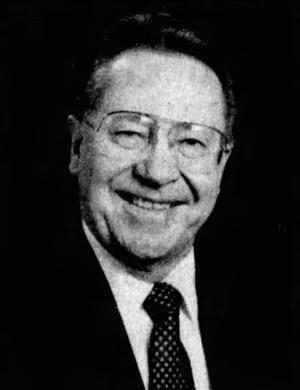Seattle business leader and philanthropist Stanley Otto McNaughton held positions with Seattle University and Safeco Insurance before he was in 1961 recruited by Robert J. Handy (1901-1984) to help reorganize and develop his group of financial and insurance enterprises. McNaughton took the lead in creating today's PEMCO Financial Services group and in 1985 succeeded Handy as its chief executive officer. The Seattle-King County Association of Realtors named Stanley McNaughton First Citizen of 1996. He died in 1998 and was succeeded by his son, Stan W. McNaughton.
Raised in Canada
Stanley Otto McNaughton was born into poverty on September 27, 1921, near Eureka, Montana. When Stan was 6, his parents John, a Canadian citizen, and Ella McNaughton moved their growing family (which ultimately numbered 11 children) to Elko, British Columbia. John disappeared soon after enlisting in the Canadian Home Guard in 1939, and Ella took odd jobs to feed her children.
In high school, Stan demonstrated an aptitude for chemistry and other sciences. Upon graduation, at his mother's urging, he immigrated to the United States to find work. He ended up helping to manage a diner in Kewanee, Illinois, and in 1941 married Clare Zorowski, a carhop at another eatery. When the United States entered World War II, McNaughton enlisted with the Army Air Force and became a navigator and instructor. His B-29 crew was training to drop atomic bombs when Japan surrendered in 1945.
McNaughton had visited the Puget Sound area during the war and moved his family to Seattle in 1947. He enrolled at Seattle University and soon found himself helping to teach business courses. After a brief return to uniform during the Korean War, McNaughton was hired by the university in 1952 to teach economics and to coordinate fundraising.
Opposites Attract
Stan McNaughton next took a job with General Insurance, the predecessor of Safeco, and made his reputation as a management expert. McNaughton's organizational skills impressed Robert J. Handy, who had founded the Washington Teachers' Credit Union, Public Employees Mutual Casualty Company (PEMCO) and Public Employees Mutual Insurance Company (PEMIC). On August 1, 1961, Handy hired McNaughton to advise him in reorganizing his financial group.
Handy and McNaughton represented very different personalities and management styles. Handy was shy and secretive, and he preferred to guide his employees through written memoranda. In contrast, McNaughton was gregarious, open, and a glib, persuasive speaker. The two men made an effective (if sometimes contentious) team. They bonded when McNaughton contracted polio shortly after going to work for Handy. To McNaughton's surprise and lifelong gratitude, Handy kept him on the payroll during his recuperation.
Creating PEMCO Financial Services
With McNaughton's advice, Handy modernized and expanded his somewhat disjointed insurance and financial operations, which had roots going back to the 1936 creation of the Seattle Teachers' Credit Union. Insurance operations were consolidated under the PEMCO shield and new coverage, notably life insurance, was added. The employee-owned PEMCO Corporation was established in 1963 to offer accounting and, later, computer and credit card services to other units and to outside credit unions.
The last major piece, Teacher's State Bank was created in 1971, and renamed Evergreen Bank a decade later. McNaughton also helped to coordinate construction of a modern headquarters in Seattle's Cascade Neighborhood for PEMCO Financial Services (an informal "family" of organizations, not a legal entity) between 1963 and 1984.
Beyond PEMCO, Handy and McNaughton worked together to support and strengthen credit union across the state. In 1975, they helped to create the Washington Credit Union Share Guaranty Association, which insures credit union deposits in this state.
Handy and McNaughton did not always see eye to eye, and Handy resigned his board and executive positions in the early 1980s in a dispute over financial strategies during the "Reagan Recession." Handy later confessed that McNaughton's more conservative approach was the prudent course. When Handy died on December 30, 1984, McNaughton had already taken charge of PEMCO Financial Services core units.
A Life of Service
McNaughton never shied from controversy. He fought bitter and public battles with the Washington Education Association, which sought to take over the credit union in the 1980s, and was an outspoken political conservative. At the same time, he was a generous philanthropist in support of education, the Museum of History & Industry, and other causes. McNaughton aided the Cascade Neighborhood in resisting city plans for a giant "Seattle Commons" park, which was rejected by Seattle voters in 1995 and 1996.
After his 65th birthday, McNaughton began to think about a successor and encouraged his oldest son, Stan W. (b. 1950), to join the firm. When the elder McNaughton died of a heart attack on January 19, 1998, his son was ready to take the reins. PEMCO remained committed to Stanley O. McNaughton's vision of "a responsible organization that makes itself of value to the community ... not just through the products and services we offer, but by the people we collect here and by the contributions they can make to the quality of life in the communities in which we do business."

